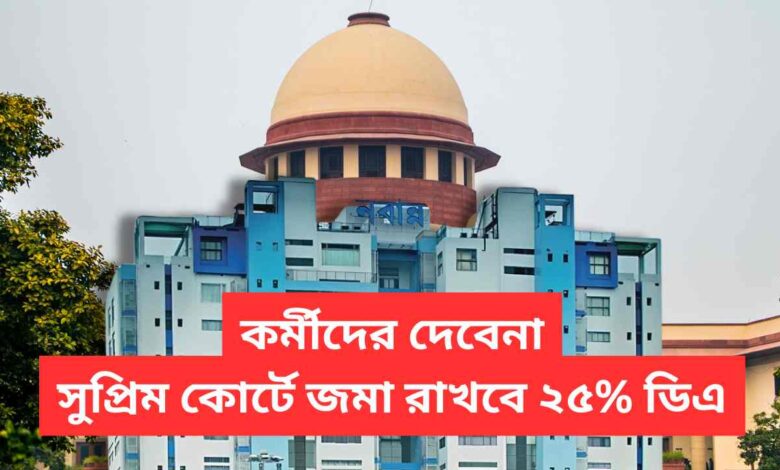DA Arrears: Breaking! WB Govt Proposes a 25% DA Deposit to the Supreme Court, Here’s the Reason

DA Arrears: The West Bengal government has filed an application in the Supreme Court regarding the payment of pending Dearness Allowance (DA), presenting several key arguments for settling 25% of the arrears. This case is extremely important for the millions of state government employees and its verdict could have a significant impact on the state’s economy. Let’s take a detailed look at the main arguments put forward by the state government.
DA is Not Mandatory
The state government’s primary argument is that the payment of Dearness Allowance (DA) is at the discretion of the employer and is not a mandatory obligation. The government believes that the decision to pay DA depends entirely on the state’s financial situation and cannot be imposed as a binding requirement.
Opposition to Linking DA with AICPI
If the payment of DA is made mandatory based on the All India Consumer Price Index (AICPI), it would undermine the employer’s discretionary power. The state government argues that the financial condition of each state varies, and therefore, linking DA to a national price index is not appropriate.
Pay Commission Recommendations are Not Binding
According to the state government, the recommendations of a Pay Commission are not legally binding on either the state or the central government. The government can implement the recommendations based on its financial capacity but is not obligated to do so.
No Obligation to Follow Central DA Rates
The state government cannot be compelled to pay DA at the same rate as the central government provides to its employees, as this would violate the constitutional and federal structure. The state has the authority to determine its own DA policy according to its financial policies.
Financial Burden and Plea for Central Loan
The state government has stated that clearing the arrears at this time is a massive financial burden due to the large number of employees and the long period for which the arrears are due (from April 1, 2008, to December 31, 2019). To clear these dues, the state would need to take an additional loan from the central government, which requires central approval.
Request for Time and Mention of Alternative Benefits
The state government has requested at least six months to arrange the funds and finalize the DA disbursement policy. The government also highlighted that it provides many other financial benefits to its employees that other states or the central government may not offer.
Proposal to Deposit 25% Arrears in Supreme Court
The state government has proposed to deposit 25% of the arrears with the Supreme Court instead of directly crediting it to the employees’ accounts. The reason for this is that if the state wins the case, it would be impossible to recover the money from millions of employees. If the state’s petition is dismissed, the funds would then be disbursed to the employees from the court.
This case is currently pending before the Supreme Court, and all state government employees are eagerly awaiting its verdict.

